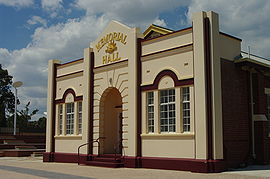Waroona, Western Australia
|
Waroona Western Australia |
|
|---|---|

Waroona Memorial Hall
|
|
| Coordinates | 32°52′00″S 115°55′00″E / 32.86667°S 115.91667°ECoordinates: 32°52′00″S 115°55′00″E / 32.86667°S 115.91667°E |
| Population | 2,157 (2011 census) |
| Established | 1895 |
| Postcode(s) | 6215 |
| Location | |
| LGA(s) | Shire of Waroona |
| State electorate(s) | Murray-Wellington |
| Federal Division(s) | Canning |
Waroona is a town located in the Peel region of Western Australia along the South Western Highway, between Pinjarra and Harvey. The town is the seat of the Shire of Waroona. At the 2011 census, Waroona had a population of 2,157.
The town was originally known as Drakesbrook, and was first settled by John Fouracre in 1891. A railway station on the Pinjarra to Picton Junction railway line with the name "Drake's Brook", named after William Henry Drake, an Assistant Commissioner General and original landholder in the area (1847), opened in September 1893 and the town was surveyed and gazetted by March 1895. The surveyor-general of the day recommended the name change from Drake's Brook to Drakesbrook as "it is more euphonious and would look better on the plan". The change was made official in October 1896, and in the same year a post office was opened.
In 1895 Joseph McDowell built a timber mill in the northern end of the surveyed townsite at present-day Mill Street, near which a railway siding was opened. Due to the unpopularity of the initial subdivision, new lots were surveyed near the mill, which became known as Waroona. This name was most probably a corruption of Werroona near the Bendigo goldfields in Victoria, believed to be McDowell's hometown. (The original word meant "resting place" in the local Djadja Wurrung Aboriginal language.)
The town was boosted by the building of the railway, for which local timber was milled for sleepers. It catered to the needs of the mill workers with a post office, general store, school, blacksmith, a number of hotels come boarding houses, churches, doctor and dentist. The farms supplied butter, fruit and vegetables for the men of the mills, and chaff for the horse teams that hauled the logs. In March 1899, McDowell's Siding was converted into Waroona Station, and figures for rail traffic on the South Western Railway reveal that total earnings of outgoing traffic from Waroona was the highest of any station from 1904-47.
...
Wikipedia

